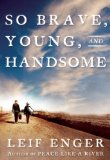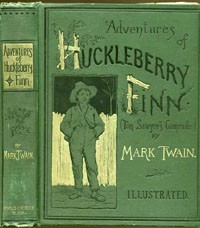So Brave, Young, and Handsome
Not to disappoint you, but my troubles are nothing — not for an author, at least. Common blots aside, I have none of the usual Big Artillery: I am not penniless, brilliant, or an orphan; have never been to war, suffered starvation or lashed myself to a mast. My health is adequate, my wife steadfast, my son decent and promising. I am not surrounded by people who don’t understand me! In fact most understand me straightaway, for I am and always was an amiable fellow and reliably polite. You, a curious stranger, could walk in this moment; I would offer you coffee and set you at ease. Would we talk pleasantly? Indeed we would, though you’d soon be bored…
 It’s a thoroughly likable voice, isn’t it? I can say for sure that he’s wrong about being boring. Let me introduce you: meet Monte Becket, the narrator of So Brave, Young and Handsome, Leif Enger’s second novel, published seven years after Peace Like a River. Monte is an author, but so far, a one-hit wonder. When the novel opens, it’s 1915 and he’s on his seventh attempt to produce a second bestseller on a par with his first book, a blockbuster western called Martin Bligh. One morning he sees a man rowing up the Cannon River in the mist. It begins an adventure in which Monte Becket steps out of story-writing and into a story, befriending the lone boatman and joining him (with his steadfast wife’s blessing of course) in his quest for redemption.
It’s a thoroughly likable voice, isn’t it? I can say for sure that he’s wrong about being boring. Let me introduce you: meet Monte Becket, the narrator of So Brave, Young and Handsome, Leif Enger’s second novel, published seven years after Peace Like a River. Monte is an author, but so far, a one-hit wonder. When the novel opens, it’s 1915 and he’s on his seventh attempt to produce a second bestseller on a par with his first book, a blockbuster western called Martin Bligh. One morning he sees a man rowing up the Cannon River in the mist. It begins an adventure in which Monte Becket steps out of story-writing and into a story, befriending the lone boatman and joining him (with his steadfast wife’s blessing of course) in his quest for redemption.
Something about Glendon Hale, the rower, reminds him of “Old Quixote,” a quintessential picaresque hero. It’s a fitting frame for this tale in which the narrator embarks on a journey that moves him spatially, but leaves us wondering at times whether he’s moving at all internally. It’s been called a western, but to me So Brave, Young and Handsome read more like a critique — lighthearted, but ironic — of the western. There’s nothing particularly romantic or swashbuckling about Monte Becket. (It’s irritating at times, frankly…) Glendon Hale is a different story, with a history more suited to a wild west tale, but this novel picks up after most of the romantic action has ended, and finds him searching for redemption and resolution of some of the complications his past has created. Apparently Enger weaves in a real-life character in Charlie Siringo, a tough-as-nails but definitely fading detective in pursuit of Glendon (and by association Monte). There are plenty of references to a legendary cast of western outlaws, but in the present the last vestige of those days is the Hundred and One, a kind of declining Disneyland of the wild west. Even the novel’s title is ironic, since none of its characters are “brave, young or handsome;” it seems to aim at a nostalgic ideal. All in all it reminded me more of Clint Eastwood’s movie Unforgiven (but much more comedic) than a romantic cowboy story with illusions intact.
Like its predecessor, this story inhabits a world filled with meaning. It doesn’t give the sense of a fictional universe freighted with consciously crafted symbolism so much as an author who sees the world as a meaningful place. It’s a setting where faith is relevant, as part of Glendon’s quest is for spiritual peace. Justice, repentence, baptism, and prayer figure in at different points. In one scene, Monte awakens to the sound of Glendon “talking — praying, it turned out, though I couldn’t tell at first since he didn’t speak in the fraught inflections common to prayers, at least my own. It was more as if he were relating to a good listener the details of the day.” I love that description.
Mostly, the tale is about Monte Becket, a writer in search of his own voice. This is the story that ties together all the others –the decaying wild west, Glendon Hale’s plight, even the subplot about Hood Roberts, a teenager who joins the pair for part of their journey and serves almost as an embodiment of Glendon’s younger self. At one point, during the section where Monte is traveling with Siringo (I’m trying to avoid spoilers and not explain it all), the crusty detective turns to him and asks, “Becket, do you actually know anything at all? Do you know even one thing that is true?” He’s referring to the large store of illusions and assumptions, and the small store of useful facts, Monte has at his disposal.
Does he “know anything”? Perhaps not of the kind of “truth” Siringo values. But writing like this doesn’t come from a narrator without a keen eye for something deeply true. Many times I smiled just at the perceptiveness and responsiveness Monte has about people, his amazing ability to capture the character of a place or person. These pages are filled with observations, economic summings-up of character, language so marvelous and playful it begs to be reread. It’s impossible not to suspect some autobiographical elements in the writerly storyline, but whether Monte finds whatever it is he’s looking for I’ll leave for the novel to reveal. It was a thoroughly absorbing yarn, one I found entertaining. I was so busy being entertained that I didn’t realize till this lengthy post how much it gave me to think about. I guess there’s more to Monte Becket than he believes.


